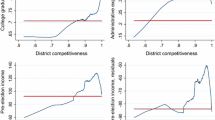Abstract
We present a model where a society elects candidates belonging to two parties to a national parliament. The electoral rule determines the seats distribution between the two parties. The policy outcome is a function of the number of seats the two parties win in the election. We analyze two electoral rules, multidistrict majority and single district proportional. We prove that under both systems there is a unique pure strategy perfect equilibrium outcome. We compare the outcomes under the two systems.
Similar content being viewed by others
References
Alesina A, Rosenthal H (1995) Partisan politics, divided government, and the economy. Cambridge University Press, Cambridge
Alesina A, Rosenthal H (1996) A theory of divided government. Econometrica 64: 1311–1341
Besley T, Preston I (2007) Electoral bias and policy choice: theory and evidence. Q J Econ 122: 1473–1510
Coate S, Knight B (2007) Socially optimal districting: a theoretical and empirical exploration. Q J Econ 122: 1409–1471
De Sinopoli F (2000) Sophisticated voting and equilibrium refinements under plurality rule. Soc Choice Welf 17: 655–672
De Sinopoli F, Iannantuoni G (2007) A spatial voting model where proportional rule leads to two-party equilibria. Int J Game Theory 35: 267–286
Farquharson R (1969) Theory of voting. Yale University Press, New Haven
Gul F, Pesendorfer W (2010) Strategic redistricting. Am Econ Rev 100: 1616–1641
Ingberman DE, Rosenthal H (1997) Median voter theorems for divisible governments, mimeo
Kalai E, Samet D (1984) Persistent equilibria in strategic games. Int J Game Theory 13: 129–144
Kohlberg E, Mertens JF (1986) On the strategic stability of equilibria. Econometrica 54: 1003–1039
Mertens JF (1989) Stable equilibria-a reformulation. Part I: definition and basic properties. Math Oper Res 14: 575–625
Moulin H (1979) Dominance solvable voting schemes. Econometrica 47: 1337–1351
Okada A (1981) On stability of perfect equilibrium points. Int J Game Theory 10: 67–73
Persson T (2002) Do political institutions shape economic policy. Econometrica 70: 883–905
Persson T, Tabellini G (1999) The size and scope of government: comparative politics with rational politicians. Eur Econ Rev 43: 699–735
Persson T, Tabellini G (2000) Political economics, explaining economic policy. MIT Press, Cambridge
Riker WH (1982) The two-party system and Duverger’s law: an essay on the history of political science. Am Polit Sci Rev 76: 753–766
Selten R (1975) Reexamination of the perfectness concept for equilibrium points in extensive games. Int J Game Theory 4: 25–55
Author information
Authors and Affiliations
Corresponding author
Rights and permissions
About this article
Cite this article
De Sinopoli, F., Ferraris, L. & Iannantuoni, G. Electing a parliament. Soc Choice Welf 40, 715–737 (2013). https://doi.org/10.1007/s00355-011-0635-1
Received:
Accepted:
Published:
Issue Date:
DOI: https://doi.org/10.1007/s00355-011-0635-1




